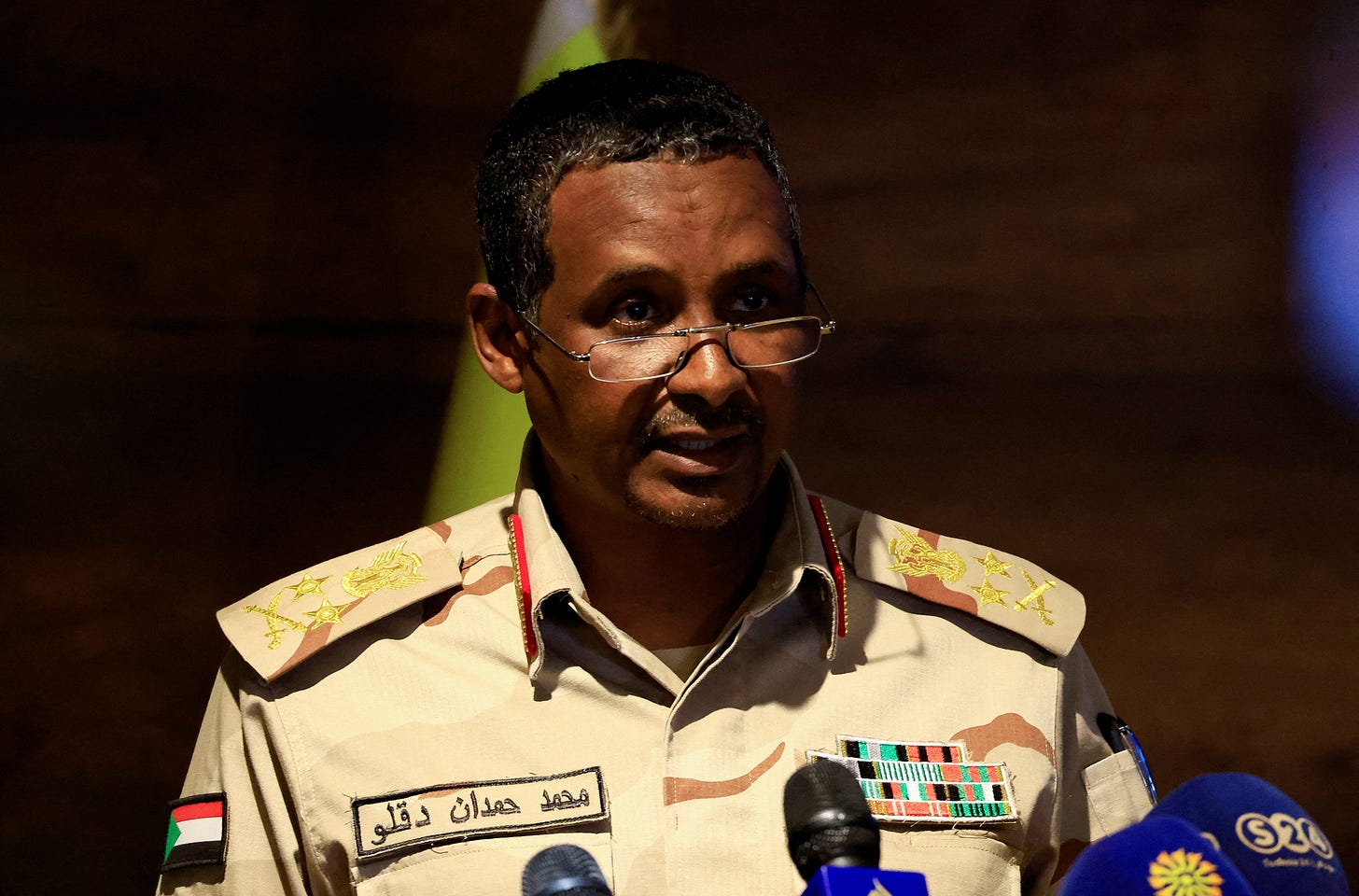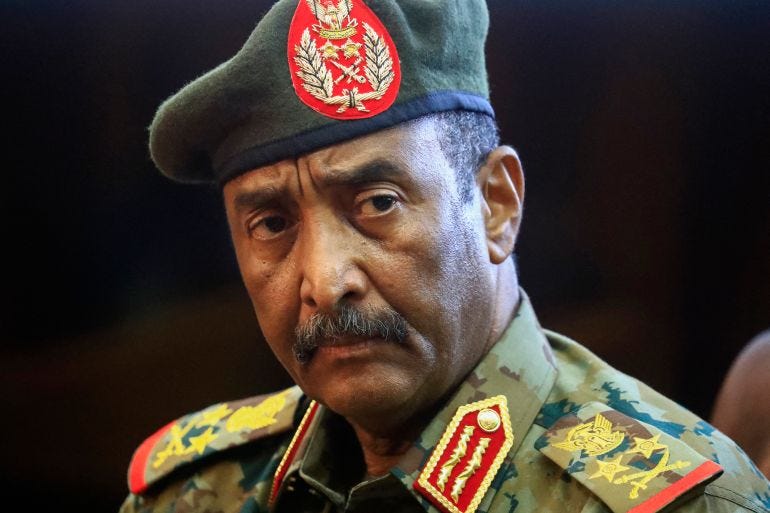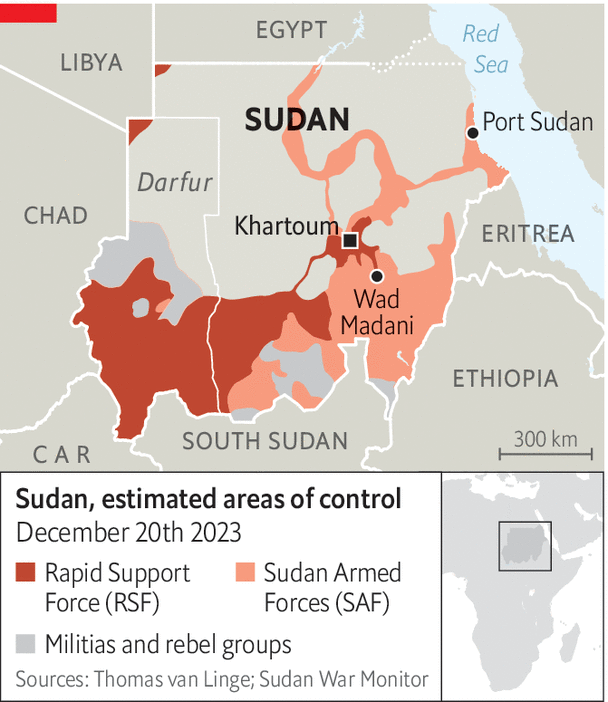While all the attention recently has been on the Middle East, and to a lesser extent Ukraine, you might not have noticed that there is yet another conflict that has been taking place for nearly a year. Of course, one of the main reasons you probably haven’t heard about it is because it is in Sudan, an African nation that doesn’t draw the same level of eyeballs (or clicks) as Israel or Europe. But that doesn’t mean what is going on in Sudan is any less devastating.
At the crux of the matter is a battle for control of the Northeast African nation, home to 50mn people. As The Economist put it, “the entire war is little more than a fight for absolute power.”
The two sides are led by men who, as allies in 2021, were leaders of a coup against the civilian prime minister. On one side is the Arab Rapid Support Forces (RSF), a paramilitary group that previously operated under the direct command of long-time Islamist dictator Omar al-Bashir that is led by Muhammad Hamdan Dagalo (better known as Hemedti). On the other side is Sudan’s army, the Sudanese Armed Forces (SAF), led by Sudan’s de facto president General Abdel Fattah al-Burhan. Neither side is anything to write home about.
A bit of history

For decades, Omar al-Bashir led Sudan as a brutal dictator.1 Finally in 2019, the Sudanese had enough of Bashir and pro-democracy protests broke out. Leaning into the political winds, Hemedti and Burhan (despite both previously having aligned with Bashir) joined forces to remove him from office. However, they were not able to do so without inflicting violence on the Sudanese. Weeks after the protests started, over a hundred pro-democracy protesters were killed by the SAF and RSF. As part of the mediation, a joint military-civilian government, basically a compromise government, was put in place. But its reign was brief.
In 2021, Hemedti and Burhan led another coup, this time against the civilian government. This second coup removed the civilian prime minister from power and strengthened the military. Burhan was named head of Sudan’s ruling council and Hemedti was named deputy. The agreement that put these men in power stipulated that the government would move towards democratic elections. This tenuous truce held for a bit but the historical RSF and SAF’s resentments towards each other2, and the lure of absolute power for each group’s leader, meant it was only a matter of time before another outbreak of violence.

This time, the precipitating incident was the SAF’s attempt to integrate the RSF into its ranks. In December 2022, a vague deal was signed between the military leaders and the civilian politicians to set Sudan on the path towards democracy. However, in order to get all of the parties to sign-on, many of the deal’s details were intentionally left unsaid. So when it came time to start integrating the RSF into the SAF, the two military minds had different notions over how long this process should take. Burhan thought it should be done quickly, in around two years, Hemedti though thought it should take ten.
The problem with this whole strategy was that if the RSF was subsumed into the SAF, Hemedti would lose any sort of autonomous support. This in turn would strengthen Burhan’s position. And as we have seen throughout the annals of history, once a strongman has power, he will do whatever he can to keep it.
The one-time allies started to mobilize their forces and accused the other of being a criminal. The war of words eventually escalated to the point of violence until on April 15, without a discernible spark, fighting commenced in the capital, Khartoum. The situation in Khartoum, a city of 7mn residents, quickly deteriorated. An April 27th report described the situation in the city.
Residents have been sheltering in their homes as attack helicopters and fighter jets scream overhead and battles rage in the street; many buildings have been reduced to rubble. Water supplies have been cut off, and electricity is intermittent; hospitals are in crisis….The World Food Program halted its operations there after three of its staff were killed. Aid compounds have been looted.
As a former advisor for the civilian government’s prime minister noted, “the army and the RSF were equally complicit in the country’s most recent political crime: the 2021 coup…Their current conflict is a battle over the spoils.”
The conflict

Since April, this conflict has been ongoing. Right now, Hemedti’s RSF controls Khartoum, and most of the other capitals in the western region of Sudan, Darfur. These cities were seized amidst reports of mass violence.
Ever since British imperialists founded the modern city on the banks of the Nile, power and wealth in Sudan have been concentrated in Khartoum. The RSF, whose rank-and-file are mostly drawn from far-flung and downtrodden regions, are now exacting their revenge. “The RSF believe they cannot create a state in their own image unless they violently destroy the old one,” argues Kholood Khair of Confluence Advisory, a Sudanese think-tank. In recent weeks, RSF fighters are alleged to have burnt land-registration records and taken over whole residential neighbourhoods. “Every house is occupied,” says another Sudanese analyst. “The city is theirs.”
In western Sudan, the RSF controls gold mines, desert borderlands connecting to refugee camps in Chad (where many Sudanese have fled to) and arms providers Libya and the Central African Republic. The SAF controls Port Sudan, the primary way to get imports into Sudan and home to the nation’s oil terminal (though the RSF controls much of the oil pipeline from South Sudan), as well as the agricultural land in the east. Reports indicate government functions have moved out of Khartoum and to Port Sudan.
In early December, the US and Saudi Arabia sponsored talks between the two warring factions in Jeddah, Saudi Arabia. However, much like previous attempts at reconciliation, these discussions went nowhere.
After the talks broke down, the RSF captured Wad Madani. The city had been a relative oasis for hundreds of thousands of civilians and a base of operations for humanitarian aid efforts. Before the war, Wad Madani’s population was ~700,000 people but its population had ballooned by over 500,000 as the Sudanese fled the devastation and destruction. In response to the RSF’s move, more than 300,000 people fled the city in four days.
Burhan has demanded the RSF withdraw from Khartoum and other cities before any progress can be made on negotiations. But the SAF’s current position makes these negotiating demands tough to countenance. In the words of a European diplomat to The Economist, “There is a glaring mismatch between the weakness of [the SAF’s] military position and their hilarious maximalist negotiating position.”
The humanitarian crisis
The current crisis bares its roots in the Darfur disaster 20 years ago.
Hemedti started out as a commander of the Janjaweed brigade. The Janjaweed is an Arab clan originally from Chad that migrated to Darfur with a natural inclination toward ethnic conflict. Known as the “evil on horseback” and described by one Clinton-era official as “a grotesque mix of the mafia and the Ku Klux Klan”, the Janjaweed were the primary perpetrators of ethnic violence in Darfur.
During his reign, Bashir modified the Sudanese constitution to define Sudan as an Arab and Muslim country where “others” were denied equal rights. This idea was epitomized by actions in Darfur. After Darfur was rocked by rebellion in 2003, Bashir sent in the Janjaweed to restore order.3 Many of the rebels were native Africans living in Darfur, while the Janjaweed supported Bashir’s Islamist regime.
In 2010, the International Criminal Court (ICC) charged Bashir and some Janjaweed leaders (though not Hemedti) with war crimes for their actions in Darfur where some 300,000 people had died and 2.5mn were displaced. During the 2010s, Bashir formalized the Janjaweed into the RSF, naming Hemedti its leader.
This has carried forward to the current crisis, where the RSF’s actions have been brutal towards the Maslit, a black African tribe that had been targeted by the Janjaweed during the previous Darfur crisis in the 2000s. The Maslit people are indigenous to Darfur, and the RSF seem to be systematically taking them out.
Earlier this month, genocidal gunmen went from home to home for three days in a refugee camp in Darfur, Sudan, looking for Masalit men and killing them. It was not the first such attack, but by the time they had finished, say locals, between 800 and 1,300 members of the black-African ethnic group had been killed.
Last month, US Secretary of State Antony Blinken accused the RSF of committing crimes against humanity and ethnic cleansing, while stating both the RSF and SAF had committed war crimes. The RSF has denied accusations of civilian assaults.
**************
With neither side operating with much regard for civilian life, the current conflict has precipitated another crisis.
Since the fighting started in April, over 12,000 people have been killed (and this is probably a massive underestimate). Even before the conflict started, over 15mn people in Sudan relied on aid. Now, more than half the population of 49mn people requires aid.4 Over 7.5mn Sudanese are displaced, and close to 1.5mn have left the country - many from West Darfur. But the situation in neighboring countries is not much better, with most of Sudan's neighbors facing their own turmoil in recent years. Sudan had been hosting a number of refugees from Ethiopia and South Sudan, who had previously fled famine and violence, but who have now returned to their home countries. Because what choice did they have?
20mn people do not have enough to eat and 6mn are on the verge of starvation. Yet, the humanitarian response has been pitiful. According to a report by the UN Office for the Coordination of Humanitarian Affiars (OCHA) on the 12th of November, only 34% of the requested support had been provided.
Emirati support
It has been an open secret that Hemedti’s RSF has been supported by the UAE. The UAE claims it does not send arms to “warring parties”, but a recent UN report noted that the Emiratis have been smuggling in weapons and armaments through neighboring Chad. One estimate has it that between May and September there were 168 supply airlifts from the Gulf state.5
How important has the UAE’s support been to the RSF? Hamid Khalafallah, a Sudan expert in the UK told the FT that without the UAE’s support “there’s an 80% chance the war might end tomorrow.” Experts suggest that the Emiratis interest in helping the RSF stems from Sudan’s stockpile of natural resources and position along the Red Sea, which could be advantageous for trade purposes.
On the other side, the SAF has received some support from Egypt, but it is small potatoes compared to what the RSF has received. Burhan recently paid Iran a visit, which appears to have borne fruit in the form of drones fitted with precision-guided missiles.
Iran has little love for the Emiratis, so this could be turning into a semi-proxy war between the Arab and Gulf states - further destabilizing the region.
****************
Despite everything that has happened since April, it appears much of Africa is ready to put this conflict to bed. This past month, Hemedti was warmly received by African leaders as he took a tour around the continent, visiting six African nations. These countries, including Kenya and Rwanda, diplomatically recognized Hemedti, suggesting that they feel the RSF will eventually win the war and rule Sudan. Supporting this theory, the SAF has had little battlefield success, or as on analyst from the Crisis Group bluntly put it, the “SAF has essentially not won a major battle of this war.”
While Hemedti’s RSF has waged a successful military campaign, the group is politically toxic. A CIA assessment of an RSF victory raised concerns about the implications for democracy and abuse in the region. To try and cut-off these issues, Hemedti recently signed a pact with Sudan’s former civilian prime minister Abdalla Hamdok, promising to promote democracy and prosecute those guilty of war crimes. However, considering Hemedti’s past relationship to government, not sure how much you can trust that this would actually work. And an obvious worry is for the disadvantaged groups that have already been marginalized by the RSF.
But with the SAF indiscriminately bombing civilian areas, it isn’t like an SAF-led regime would be a great outcome either for the Sudanese. Without flexible negotiations supported by the outside parties backing the RSF and the army, nothing will get solved - and the Sudanese will continue to suffer.
He had long been a thorn in the side of the US, having previously been a Saddam Hussein ally during the Gulf War and hosting Osama bin Laden in the 1990s.
The SAF saw the RSF as a poor imitation of a military while the RSF felt this was an unfair mischaracterization.
The SAF’s control of Port Sudan is preventing aid from reaching RSF-controlled territories.
The UAE claims these flights to Sudan have been filled with humanitarian aid to help set up a hospital.




what a brutally sad situation.....